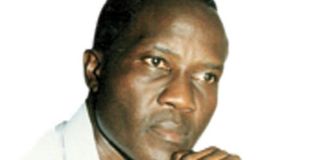Sorry, Prof Kanyeihamba, I am not for demolition

Alan Tacca
What you need to know:
- By contrast, belief in the existence and the power of God and other supernatural spirits are matters in the category of speculation and superstition, whether they are celebrated in thatched shrines or glittering cathedrals. I am puzzled why Prof Kanyeihamba cannot understand (or accept) this fundamental difference.
Yes, Prof Kanyeihamba, you cannot roll out a lawnmower and call it a bulldozer.
Demolition man? (Sunday Monitor, June 4). The people who enjoy cockfights and other blood sports may not warn you, but you could perish in these trenches before you realise that they are not a temple.
What holy ground you are talking about? You are mimicking Moses. Hm, that was interesting, God hiding in a bush.
But thank you for not fleeing; although you must now fight your battles without leaning on strangers and their witticisms. Who is Peter Sutton? Mbu Fr Peter Sutton said: “Where one believes, no explanation is necessary, but where one does not believe, no explanation is possible.”
Then what and why are you explaining?
I can also quote Bertrand Russell, or Wittgenstein, or Sartre, or Stephen Hawking. And you and your padre may be seen retreating with your tails between your legs.
But to the other readers, I have concluded that Prof Kanyeihamba has a problem with recognising ‘categories’. Otherwise he would not confuse biological fatherhood with speculation about the Godhead.
Without conducting DNA tests, we usually accept that the blokes regarded to be our fathers are indeed our biological fathers, because we have found no cause to contest that relationship. Life is not a regime of litigation.
However, if anyone found reason to justify a contest, there is now a scientific way of resolving the question of paternity.
Moreover, even before DNA, we could in theory design a ‘farm’ where sexual activity was so strictly controlled that we could be sure about the fathers of the rats (or people) bred at the institution.
Paternity is, therefore, in the category of problems where certainty is possible.
If the interested parties wanted, the herd of children alleged to be the late Prof Mukiibi’s offspring would be a classic opportunity to demonstrate my argument.
By contrast, belief in the existence and the power of God and other supernatural spirits are matters in the category of speculation and superstition, whether they are celebrated in thatched shrines or glittering cathedrals.
I am puzzled why Prof Kanyeihamba cannot understand (or accept) this fundamental difference.
Although entirely free to hold any religious beliefs, it seems he would only be comfortable if everybody said Prof Kanyeihamba’s beliefs cannot be disputed.
He has rightly judged that Prof Isaac Ojok/Alice Lakwena, or ‘prophet’ Samuel Kakande and all those ‘miracle’-performing Pentecostal preachers could be “false” or “cheats”, but he regards the speedy healing of his injured hip a “concrete example of divine manifestations”.
I will put away a possible misunderstanding. As Kanyeihamba was writing about his hip last Sunday, I as separately writing that Sarah’s faith (in God) could have contributed to her late conception of Abraham’s son, Isaac.
Thanks to the complex chemistry of the nervous system, there is evidence that believing in something can sometimes have beneficial effects on the healing process in the rest of the body. This does not prove that what you believe in exists, or has any (intrinsic) power. It is the state of believing that matters. So, believing in God, or an ancestral spirit, or a river deity, or an armlet, could be equally effective.
By the same token, if you believe that you are being bewitched, your condition may deteriorate.
But when the effect is said to be so dramatic that it is in the category of a miracle, questions arise.
Yes, Kanyeihamba’s faith in Eva’s prayer could have helped his healing. But the damage may not have required a hip replacement as had been pronounced.
Doctors – even top consultants – are not infallible. X-rays only give them part of the picture. There are other diagnostic tools. Plus professional skill and ‘gifted’ insight.
Moreover, the diagnosis could have been generally correct, but the prognosis (how the injury would progress) wrong. Kanyeihamba would not be the first such case.
He was also taking some medication.
Since Eva and ‘another woman’ have not set up a clinic as faith-based hip fixers, where other cases similar to Kanyeihamba’s are documented, the reader will decide how much of the professor’s story to take home.
Mr Tacca is a novelist, socio-political commentator.




